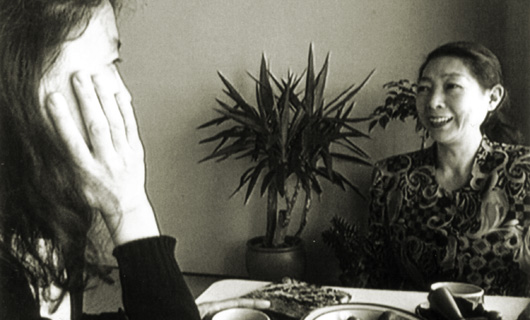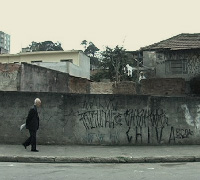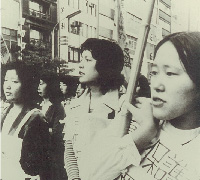ブラジルから来たおじいちゃん
Um Senhor do Brasil Visitando Brasileiros no Japão
A Grandpa from Brazil

ブラジルから来たおじいちゃん公式サイト
A Granpa from Brazil official site in Japanese and Portuguese
http://nanakokurihara.com/senhordobrasil/index.html
予告編へ To Trailer
「しみじみと胸うつ感動!」 サンパウロ新聞
「おじいちゃんのしわの深さ、表情、そして、佇まいがすべてを物語っている。日系人が歩み、乗り越えてきた長い長いストーリーを。」 宮沢和史(ミュージシャン)
「80になっても、90になっても、いきがいを求め、人々を愛し、自分は何者かと考え続ける。『自分が決めたことだから』とブラジルでの苦難を耐え切った人の老いの生きざまは、なお未来を向いてすがすがしい。美しい笑顔と映像から、静かな感動と生きる力を頂いた。」 堀田 力(さわやか財団理事長)
「1世紀を生き抜いてきた老移民がふりかえるみずからの姿。日本に見て聞いて語る在日ブラジル人の姿。そこに海外移住とデカセギの凝縮された生きざまを見る思いがした。ブラジル移住100年にふさわしい珠玉のドキュメンタリーである。」 中牧弘允(国立民族学博物館教授)
This film by Nanako Kurihara focuses on a resourceful and dignified 92-year-old Japanese man who emigrated to Brazil in 1931, raised a large and loving family, and now travels regularly to Japan to help Brazilians who have been brought in as low-paid guest workers in Japan. His reflections on nearly a century of transnational experiences provide a vivid picture of the special challenges that foreign workers face and their creative strategies for solving them.
Laura Hein
Professor of Japanese History, Northwestern University
“Deeply Moving”
Jornal São Paulo Shimbun
解説
紺野堅一さんは、現在92歳。不況まっただ中の戦前の日本から、出稼ぎのつもりで単身ブラジルに渡って72年。言葉もわからない土地で、10回も職業を変え、破産の憂き目にもあった。だが、諦めずに努力した甲斐があって、今ではサンパウロで悠々自適の暮らしをしている。
しかし、紺野さんは家でじっとしているご隠居さんではない。今年も紺野さんは飛行機だけでも26時間かけて日本にやってくる。それは日本に出稼に来ている 若いブラジル人たちを訪ねるためだ。日本在住の日系ブラジル人の数は現在31万人を超え、増加と滞在長期化傾向にある。彼らの姿が、出稼ぎのはずがブラジ ルに定住するはめになった自身の体験と重なる。彼らの将来はいったいどうなるのか。子供たちの教育の現状はどうか。若い世代の仕事の苦労話に耳を傾け、子 供たちに勉強の様子を尋ねる。先生たちと懇談するため学校へも出かけていく。
そして、この旅は彼自身の人生を振り返る旅でもあった。「大日本帝国臣民」として、それともブラジル人として人生を終わるのか。レイルパス片手に新幹線、ローカル線、バスと乗り継ぎ、自分の足で歩きながら考える。
うんと前からグローバルに生き抜いてきたおじいちゃんのくれるアドバイスは? また、旅の末に、彼のたどり着いたアイデンティティとは? 90歳を超えても遠い未来を見すえて、希望を語るおじいちゃんの物語、はじまり、はじまり。
Synopsis
A Grandpa from Brazil focuses on the journey of Mr. Ken’ichi Konno, a ninety-two-year-old Japanese who migrated to Brazil in 1931. In telling Mr. Konno’s story, A Grandpa from Brazil also traces the history of Japanese immigration to Brazil and the current “reverse immigration” from Brazil to Japan.
Mr. Konno traveled alone to Brazil when he was nineteen years old to escape the financial crises of his homeland. During the Great Depression, the Japanese government promoted a policy of dispatching citizens overseas to reduce the pressures of overpopulation. Promised an easier life in Brazil, young Konno saw emigration as his only choice.
Through grit and good luck, he became the patriarch of a large, mixed family. Though he has found peace at the end of his long life, he does not forget that others are still fighting his old battles. In particular, he concerns himself with Brazilians of Japanese descent who have recently made the journey from Brazil to Japan in search of a more prosperous society. 320,000 Japanese-Brazilians have filled job vacancies caused by labor shortages in Japan, far exceeding the 250,000 Japanese who emigrated to Brazil over the last century.
When visiting Japan, Konno listens to these “new” immigrants talk about their problems and offers advice to them, even meeting with local schoolteachers. He also visits landmarks of his youth that inspire him to reflect upon the joys and sorrows of his life.
This timely, passionate tale follows a seemingly ordinary man on his extraordinary journey.
対象となる課目
社会科、グローバリゼーション、多文化共生、国際交流、移民、地球市民、トランスナショナル文化等
Related Subjects
Brazil, Japan, Social Studies, History, Globalization, Diversity, International Exchange, Intercultural Communication, Immigration, Global Citizenship, Transnational Culture
これまでの上映
東京国際女性映画祭、東アジア移住共生映画祭、グローバリゼーションとひとの移動映画祭
北九州ビエンナーレ、ジャパン・ファウンデーション・サンパウロ、ブラジル大使館、関西ブラジル人コミュニティ、群馬県太田市定住外国人子ども支援事業推進協議会、JICA中部、JICA大阪
大阪大学、京都精華大学、シカゴ大学、獨協大学、名古屋大学、名古屋学院大学、ノースウェスタン大学、浜松学院大学、龍谷大学、大阪学院大学、早稲田大学等
Past Screenings
The film had a premiere at the Tokyo International Women’s Film Festival in 2008. It happened to be released in the year of a centennial of Brazilian emigration to Brazil and Lehman shock in which a number of Brazilian workers lost their work and often also home. The film had theatrical runs across Japan and also has been screened at more than seventy locations, especially colleges and a number of communities with large Brazilian population. In the United States, it was shown at Northwestern University and University of Chicago.
will be shown at the Association for Asian Studies Conference March 2012 in Toronto
Tokyo International Women’s Film Festival, Kitakyushu Biennial, East Asian Migration Film Festival, Globalization and Human Migration Film Festival
Kitakyushu Biennial, Japan Foundation São Paulo, Embassy of Brazil Tokyo, Kansai Brazilian Community, Ota City Gunma Prefecture
Osaka University, Nagoya University, Dokkyo University, Nagoya Gakuin University, Kyoto Seika University, Hamamatsu Gakuin University, Ryukoku University, Osaka Gakuin University, Waseda University, JICA Chubu, JICA Osaka and others
DVD購入はこちら For DVD Purchase
上映レンタルはこちら For DVD Rental

監督 栗原奈名子
撮影 栗原奈名子、エリオ・イシイ(サンパウロ)
編集 斉藤貴志、今野裕一郎
整音 小川武
音楽 道下和彦
Director & Producer Nanako Kurihara
Editor: Takashi Saito, Yuichiro Konno
Cinematography: Nanako Kurihara, Helio Ishii (Sâo Paulo)
Sound Design: Takeshi Ogawa
Original Music: Kazuhiko Michishita
2008年 ドキュメンタリー作品/カラー/ミニDV/60分
日本語・ポルトガル語/ポルトガル語・ 日本語字幕
協力 関西ブラジル人コミュニティ、BUSSTRIO、NPO大阪アーツアポリア
後援:駐日ブラジル大使間、日本ブラジル中央協会、IOM(国際移住機関)
2008 / 60 minutes / color / sound / miniDV / NTSC / Japan, Brazil
Japanese, Portuguese / English subtitles
ルッキング・フォー・フミコ
Ripples of Change

「心奪われる作品」 - ニューヨーク・ニューズデイ
「激しくパーソナル」 - フィラデルフィア・エンクワイアラー
「とても深遠で美しい作品』 - WBAI-FM放送
“A powerful and daring work.”
- Kyoko Hirano
Film Center, Japan Society
“Fascinating, cross-culturally inspiring.”
- Robin Morgan
Ms. Magazine
“A unique opportunity for thought-processing the notable similarities in the US and Japanese movements towards sex/gender equity.”
- Library Journal
解説
ひとりの日本女性との出会いからニューヨークに住む監督が日本のウーマン・リブ運動を探すたびに出る。70年代当時マスコミから否定的に扱われ、わずか5年で社会の表面から消えていったリブ運動、その本当の姿は未だによく知られていない。いったい何を求める運動だったのか。日本社会はどのような影響を受けたのか。関わった女たちは今どんなふうに生きているのか。カメラは当時のリブ参加者を追って日本へ。様々な人生を生きてきた彼女たちの暮らしぶりとその言葉から、四半世紀の女性史が垣間見える。ふんだんな資料映像が当時の熱気を伝え、単刀直入なインタビューがリブ運動の感性と思想を明らかにする。「女として私はどう生きたいのか」を追求し続けた女たちの姿をみずみずしく描いたパーソナルなドキュメンタリー。
Synopsis
Powerful political analysis is combined with a passionate personal story in this exceptional documentary about the Japanese women’s liberation movement in the 1970’s and its influence on contemporary Japanese society. Director Nanako Kurihara left her homeland in the 1980’s, frustrated by the lack of interesting roles for women in Japan. In New York, she met a Japanese woman who had been involved in the women’s liberation movement in Japan in the 1970’s. Kurihara returned to Japan, bringing together interviews with veterans of the movement, fascinating archival footage and her personal impressions to produce a film which explores the meaning of the liberation movement, the factors that motivated it and the effect it has had on people’s attitudes. RIPPLES OF CHANGE is an excellent resource for the study of global feminism, women’s roles and Japanese society.
対象となる課目
社会科、歴史、女性史、フェミニズム、ジェンダー、男女共同参画、多文化共生等
Related Subjects
Related Subjects: Japan, Asian Studies, Women’s Studies, Gender Studies, Feminism, Global Feminism, History, Diversity
「ルッキング・フォー・フミコ」は、世界の数々の映画祭、大学、女性センター、美術館/博物館で上映、加えて海外のテレビでも放映され、日本の70年代の 女性運動の歴史を世界に、若い世代に伝えた。国際交流基金、東京都女性財団、放送基金、NY芸術カウンシル、アストレア財団から助成を受けている。
“Ripples of Change” was screened internationally at film festivals, universities, women’s centers, museums. It was broadcast at foreign public televisions, PBS in the United States and SBS in Australia. It has been used in a classroom internationally at colleges and universities.
It was funded partially by the Japan Foundation, Hoso Bunka Foundation, Tokyo Women’s Fund, NY State Council for the Arts, Astraea Foundation.
受賞暦
サンフランシスコ国際映画祭、サーティフィケート・オブ・メリット受賞
全米教育映画ビデオ祭、多文化主義部門ゴールド・アップル賞受賞
映画祭上映
東京国際映画祭カネボウ国際女性映画週間、マーガレット・ミード映画祭、ロンドン映画祭、フランス・クレテイユ国際女性映画祭、ボンベイ(ムンバイ)国際 映画祭、ハワイ国際映画祭、オーストラリア・シドニー国際映画祭、アメリカン・フィルム・インスティチュート・ビデオ祭、サンフランシスコ・アジアン・ア メリカン国際映画祭、スペイン女性映画祭、シカゴ・ウィメン・イン・ザ・ディレクターズ・チェア映画祭、ドイツ・ドルトムント女性映画祭、ソウル女性映画 祭招待作品
大学、美術館等上映
スミソニアン・インスティチュート、シカゴ大学、コロンビア大学、バーナード大学、ミシガン大学、ブリンモア大学、東京大学、東京ウィメンズ・プラザ、ドーン・センター等で上映
テレビ放映
米国公共テレビPBS放送、オーストラリアSBS放送放映
- Film Festivals
- National Educational Film and Video Festival, Gold Apple
- San Francisco Film Festival, Certificate of Merit
- Tokyo Film Festival
- London Film Festival
- Margaret Mead Film Festival Margaret Mead Film Festival
- San Francisco Asian American Film Festival
- Hawaii International Film Festival
- Sydney International Film Festival
- Bombei International Film Festival
- American Film Institute Video Festival
- Seoul International Women’s Film Festival
- Creteil International Women’s Film Festival
- Chicago Women in the Director’s Chair Film Festival
- Dortmund Women’s Film Festival
- Spain International Women’s Film Festival
- Museum, Colleges, and Universitites
- Smithonian Institute, University of Chicago, Columbia University, Barnard College, University of Michigan, Bryn Mawr College, University of Tokyo, New York University, Osaka University, Waseda University, Kyoto Sangyo University, and others
DVD購入はこちら For Purchase
上映レンタルはこちら For Rental

撮影 スコット・シンクラー
編集 栗原奈名子、スコット・シンクラー
登場する人たち(敬称略) 岩月澄江、田中美津、舟本恵美子、村上朋子、大和説子
1993年 ドキュメンタリー作品/カラー/16ミリフィルム・ビデオ/57分
英語・日本語/日本語
製作助成:東京女性財団、国際交流基金、ダウンタウン・コミュニティ・テレビジョン・センター、アストレア・ファウンデーション、放送文化基金、メディア・アライアンス、ウィメン・メーク・ムービーズ
配給 シグロ 〒164-0001 東京都中野区中野5-24-16 中野第二コーポ210
電話:03-5343-3101 www.cine.co.jp
Produced and directed by Nanako Kurihara
Cinematography: Scott Sinkler
Editors: Nanako Kurihara, Scott Sinkler
People who appear in the film: Sumie Iwatsuki, Mitsu Tanaka, Emiko Funamoto, Tomoko Murakami, Setsuko Yamato
US/Japan, 1993, 57 minutes, Color, VHS/16mm, Subtitled
distributed by Women Make Movies http://www.wmm.com
The film received funds from the Japan Foundation, Tokyo Women's Fund, Hoso Bunka Foundation, New York State's Council on the Arts, and Astraea Foundation.





